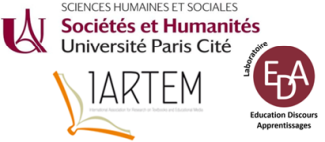During the last three decades there has been a growing volume of research into 3-6 years old children that investigates informal learning of numbers, shapes, space or time, at kindergarten or home, through multiple resources such as picturebooks or educational media, used by children alone or in interactions with parents caretakers or researchers (Björlund, van den Heuvel-Panhuizen, & Kullberg, 2020). The link with the cognitive dimension and mathematics knowledge development is crucial, considering that numerical and spatial-geometric aspects play an important role in children's cultural life. My research examines two of those home-environment resources, Numberjacks and Numberblocks, two well-known British educational children's television series, focusing on elementary numbers.
This proposition is original, according to the humanities and social science or scientific databases[1], where less than four articles mention Numberjacks ou Numberblocks in their study, mostly written by psychologists, except for the one written by Susan Edwards a philosopher and early childhood education researcher (Edwards, 2010). She offers a cultural historical reflection on contemporary society and the early childhood curriculum related to how digital media such as Numberjacks and other educational childhood programs influence language learning and the introduction to cultural and scientific knowledge. For my part, I am interested in the conceptions that govern the choice of disciplinary knowledge explored, the choice of narrative, and the modes of interaction a priori with young viewers.
My interest in Numberjacks and Numberblocks comes from my interest in studying the multiple uses and conceptions of numbers, in relationships between the life of numbers in society, in mathematical contexts, and in contexts of resources that are designed for children developing number cognition, but out of school (even if teachers use or could use them). A previous study of this type in the context of children's literature enabled me to highlight graphic games and language games with numbers that go far beyond their usual meanings, and place the initiation of young children in an epistemological, social and cultural perspective (Gobert, 2021).
My theoretical and methodological framework is the semiotic perspective developed by François Conne, researcher in didactics of mathematics, around experience/knowledge links (Conne, 2008), based on Peirce's semiotics. I use 'semiotic cuts' to highlight the underlying conceptions of the authors of Numberjacks and Numberblocks: conceptions of the world of mathematical numbers, conceptions of its relationship to reality and society, and conceptions of the ways in which young children are introduced to and acquire such knowledge.
For this presentation, the investigation was based on the study of fifteen minutes of each series: the first episode of Numberjacks and the first three episodes of Numberblocks. This corpus was sufficient to identify radically different conceptions in this first study. Initial results show that the conception underlying Numberblocks is the same as the conception usually underlying school curricula (in France), and most didactic research on the teaching and learning of numbers in the early years of schooling: a single focus on the relationship between quantities and numbers with an analogy through actions on quantities and arithmetic writing. On the contrary, Numberjacks' authors propose a global approach to the world of numbers, its relationship with society, the social practices that serve as a reference, and the plurality of interpretations of numbers and their uses.
Numberjacks challenge the usual curricular choices made by most school textbooks, educational resources, but also in usual topics in didactics research. Scrutinizing Numberjacks and Numberblocks more deeply, in an epistemological, semiotic and societal approach, could highlight tensions and open or revive debates in didactics research or educational sciences about math education in early childhood.
References
Björklund, C., Van den Heuvel‑Panhuizen, M., & Kullberg, A. (2020). Research on early childhood mathematics teaching and learning, ZDM, special issue 52(4), 607-819. New York: Springer.
Conne F. (2008) L'expérience comme signe didactique indiciel, Recherches en didactique des mathématiques, 28 (2), 219-264.
Edwards, S. (2010). Numberjacks are on their way! A Cultural Historical Reflection on Contemporary Society and the Early Childhood Curriculum. Pedagogy, Culture and Society, 18(3), 261-272.
Gobert S. (2021) Nombres et littérature jeunesse : formes de narration et usages des nombres, Strenae 19.
[1] Consulted: Jstor, Eric, Cairn, Sociology Collection, Cyberlibris Scholar Vox and Web of Sciences (November 2023)

 PDF version
PDF version
